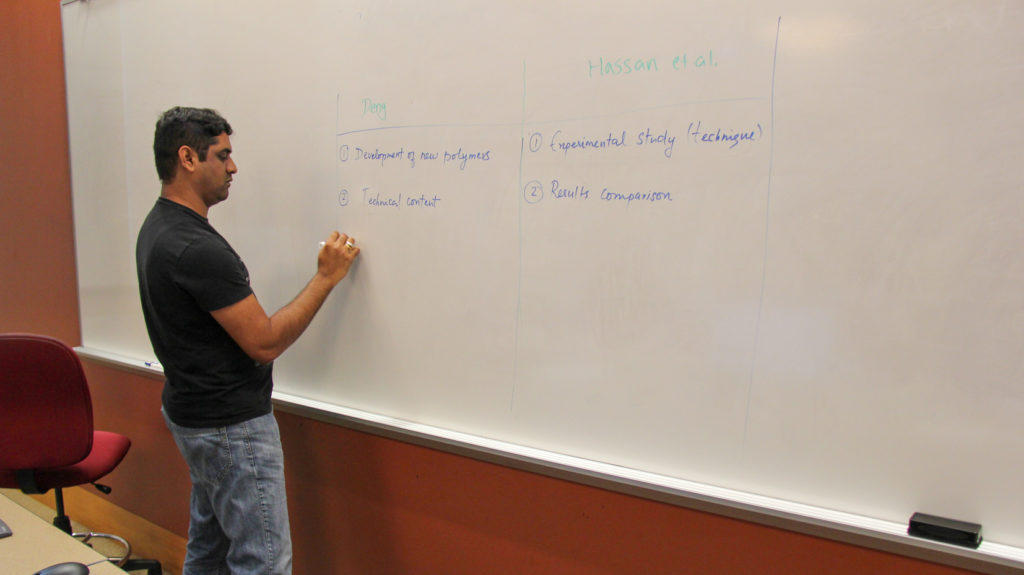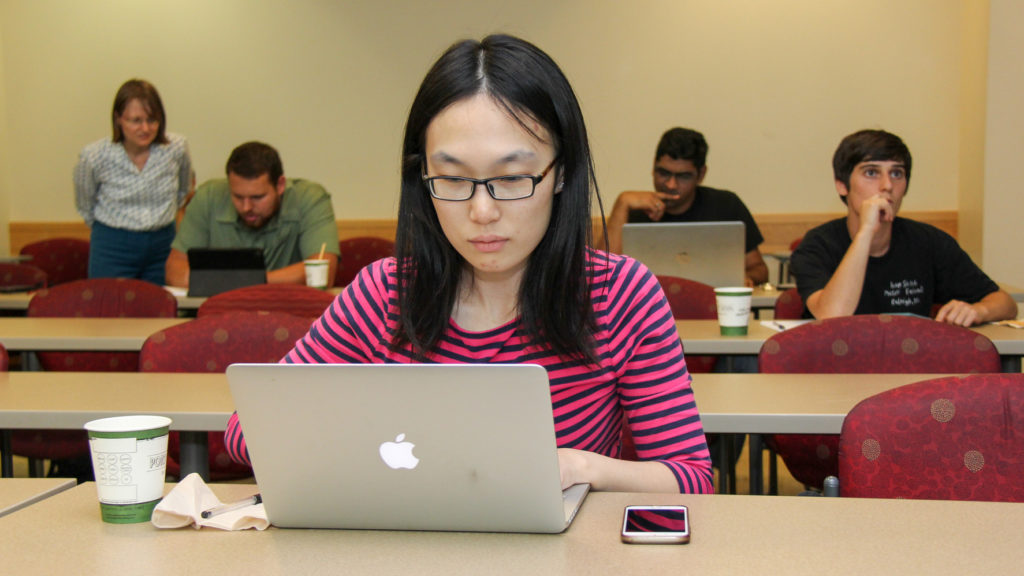Workshops and Support
The NC State Graduate School offers workshops to support all graduate and postdoc trainees’ long-term development as writers. All of these workshop count as requirements or electives towards the Communication Skills Certificate. Click each title below to see a description of the workshop.

Foundational Workshops
These core Communication Skills Competencies workshops are designed with an emphasis on creating clear, concise, and audience-centered communication practices. NC State graduate students and postdocs can can earn the certificate by participating in the four core workshops, four elective workshops, writing retreats, and other communication support programs through the Graduate School.
Writer’s Toolkit
In this two part workshop, we’ll focus on strategies for planning and managing a writing project, as well as fundamental tips for structuring writing for a variety of contexts. Participants will clarify their writing goals for the semester and learn strategies to implement on current and future writing projects. We will use different genres of writing projects as case studies, so participants will also gain tips for summarizing, paraphrasing, and synthesizing their writing projects.
User-Friendly Writing
In this two part workshop, we address the challenges of conveying your research story in a persuasive way for technical and nontechnical stakeholders. We will focus on various structures of writing across STEM and humanities fields to include organization and interpretation of results. These will include technical/non-technical reports, results & discussion sections or articles and theses, and similar types of writing projects. Specifically participants will practice and discuss strategies for:
- Choosing an appropriate structure for reporting and commenting on data
- Effectively organizing data commentaries
- Integrating figures and visuals in reports
- Structuring and revising report
Concise Communication
Do people say that you communicate too much verbally or in written form? In this interactive Concise Communication (formerly Concise Writing) workshop, we’ll address the challenge of building clear, concise sentences that represent your science to diverse stakeholders. Using Richard Lanham’s famous “Paramedic Method” and other approaches, participants will leave the session with strategies for “user-friendly” sentences in reports and other areas of workplace communication.
Professional Emails
Contact colleagues at NC State and beyond with tact and ease! In this workshop, you will gain strategies for crafting effective professional emails. Specifically, participants will practice and discuss strategies for:
- Organizing a professional email message
- Making inquiries and requests
- Creating a professional tone or voice in email
Elective Workshops
Writing Abstracts & Introductions
Where to start? In this workshop, we tackle the challenge of composing two key components of a research article: Abstracts and introductions.
Participants will specifically practice strategies for:
- Adapting common abstract structures to their own article projects
- Effectively organizing introductions using the “Create A Research Space” (CARS) model
- Using appropriate verb tenses in introductions and abstracts
- Starting or revising their own abstracts and intros
Lit Reviews (non-engineering)
You’ve gathered lots of articles and other sources. What next? In this workshop, we address tips for effectively structuring and synthesizing sources (“literature”) in journal articles and research papers.
Participants will specifically practice strategies for:
- Summarizing sources and organizing summaries
- Integrating sources into their article of research paper using common “lit review” structures
- Paraphrasing sources
- Using appropriate reporting verbs and transitions to synthesize sources
- Revising their own lit review paper, chapter, or section
How to Design Lit Reviews
In this two-part workshop, we address the challenge of creating lit reviews that situate your research in the state-of-the-art. Explore best practices for literature searches with the NC State Engineering Libraries Team in the first session and then learn how to organize a lit review paper, chapter, or section in the second meeting.
Specifically, participants will practice and discuss strategies for:
- Conducting literature searches with common STEM databases
- Organizing lit reviews
- Choosing an appropriate structure of lit reviews for their engineering field or goals
- Synthesizing literature
How to Summarize Your Work
In this workshop, we tackle the challenge of composing two key components of a research article: Abstracts and Introductions.
Participants will specifically practice strategies for:
- Adapting common abstract types to their own research projects
- Effectively organizing introductions using the famous “Create A Research Space” (CARS) model
- Choosing appropriate intro and abstract structures for their research goals
- Starting or revising their own abstracts and intros
Results & Discussion Sections
Write up the results. There’s more to it! In this workshop, we explore how to create strong results, discussion, and conclusion sections.
Specifically, participants will practice and discuss strategies for:
- Choosing an appropriate structure for results/discussion sections in their field
- Effectively organizing data commentaries
- Linking discussion section to literature/past findings
- Answering the “so what question” (impact) about their research in discussion and conclusion section
- Starting and/or revising their own results/discussion section
How to Plan a Journal Article
Get a head start on your journal article. Participants in this workshop will practice strategies for time managing a writing project and choosing a journal to publish their work.
Specifically, participants will practice how to:
- Search for journals that are a good “fit” with their discipline and project
- Critically and navigate interpret journal websites to identify the journal’s scope, mission, and audiences
- Plan and manage a journal article or other large writing project
- Set writing-related goals
How to Organize Journal Articles
Get a head start on your journal article or report. In this interactive workshop, participants will explore common strategies for organizing information in academic writing.
Specifically, we will practice strategies for:
- Identifying common organization structures for articles and papers
- Comparing how information is organized in different disciplines using sample journal articles
- Critically reading articles with an eye for structure
This workshop is designed for writers starting to draft a journal article or papers, as well as those looking for a refresher on the organization of academic writing and/or strategies for effectively summarizing articles.
How to Respond to Reviewer Feedback
In this workshop, we’ll address the challenges of interpreting journal article reviewers’ comments and revising your article. For the first part, we’ll look at how reviews are constructed and strategies for composing effective replies to reviewers. Participants will also have time to implement reviewer feedback and compose their own responses to reviewers to complete the feedback cycle.
Additional Elective workshops will be announced as these opportunities become available. Check back on this page or the registration page for new elective opportunities.
Communication Skills Resources for Graduate Students, Postdocs and Faculty
Individual Communication Consultations: Trainees can meet for 30-60 minute sessions to work on specific documents of their writing or to prepare for a speaking engagement, such as a conference. Get strategies for approaching these types of communication in context, whether that is starting or strengthening your academic writing or planning a defense.

Class Visits and Workshop Events: We are happy to collaborate with faculty from departments such as College of Engineering to spread the word about our communication skills and other professional development initiatives, for example, in the required first-year seminars. Faculty can request a course visit for a brief informational presentation about the Graduate School’s resources in their classes or collaborate to design a more extensive, “hands-on” workshop around a departmental event.
Written and Verbal Communication Course Consultations: We are happy to offer suggestions on designing and implementing written and verbal communication into courses, building bridges with writing-focused departmental courses and other interdisciplinary courses.